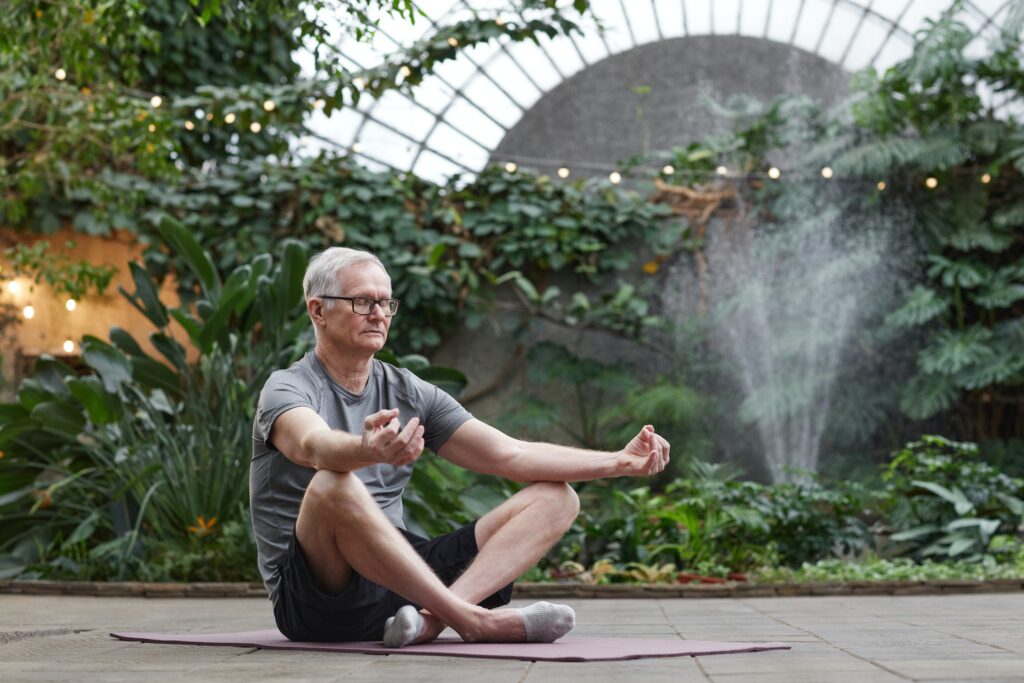In the hustle and bustle of modern life, we often underestimate the profound influence our mindset has on our physical health. The way we think about our bodies, our habits, and our overall well-being can significantly impact the state of our health. In this exploration of “Building Healthy Mindset Habits: Adapting the Way You Treat Your Body,” we’ll uncover the intrinsic link between mindset and physical health. By the end, you’ll have valuable insights and actionable steps to cultivate a healthier relationship with your body, leading to a more vibrant and fulfilling life. Join us on this transformative journey as we delve into the power of a positive mindset for your body and overall well-being.

The Power of Positive Self-Talk
Understanding the Impact:
Positive self-talk is the cornerstone of a healthy mindset, especially when it comes to body image and self-esteem. The way we speak to ourselves, internally and externally, can shape our perceptions, behaviors, and overall well-being. Negative self-talk can lead to a distorted body image, erode self-esteem, and hinder our ability to take care of our bodies effectively.
Actionable Strategies:
Practice Self-Compassion: Treat yourself with the same kindness and understanding you would offer to a dear friend. When you make a mistake or face challenges, be gentle with yourself rather than resorting to self-criticism.
Challenge Negative Thoughts: When negative self-talk arises, pause and challenge those thoughts. Ask yourself if they are based on facts or if they are simply ingrained beliefs. Replace them with positive affirmations and constructive statements.
Gratitude Journaling: Regularly jot down things you appreciate about your body and your overall health. This practice shifts your focus toward the positive aspects of your physical self.
Celebrity and Mental Health Advocate Example:
One shining example of a celebrity who transformed their relationship with their body through self-compassion is Demi Lovato. Demi has been candid about their struggles with body image and self-esteem, and how they overcame them by embracing self-love and self-acceptance. Demi’s journey towards positive self-talk and self-compassion has not only improved their own mental health but also served as an inspiration to countless others facing similar challenges. Their advocacy for mental health and body positivity reinforces the idea that embracing a compassionate mindset towards oneself can lead to profound personal growth and well-being.

Mindful Eating for Nourishment
Understanding Mindful Eating:
Mindful eating is a practice that invites us to be fully present during meals, fostering a deeper connection with our bodies and the food we consume. It’s a practice that extends beyond nutrition; it’s about savoring each bite, understanding hunger cues, and cultivating a healthier relationship with food.
Benefits for Physical Health:
Weight Management: Mindful eating encourages portion control and a better understanding of satiety cues, potentially aiding in weight management.
Digestion: By savoring food and chewing thoroughly, it promotes better digestion and nutrient absorption.
Stress Reduction: Mindful eating can reduce stress-related eating habits, like emotional eating.
Practical Tips for Mindful Eating:
Eat without Distractions: Turn off screens, put away books, and focus solely on your meal.
Chew Slowly: Take your time to chew each bite thoroughly, savoring the flavors and textures.
Engage Your Senses: Pay attention to the colors, smells, textures, and tastes of your food.
Listen to Your Body: Tune in to your body’s hunger and fullness cues. Eat when hungry and stop when satisfied.
Real-Life Stories of Transformation:
One inspiring story of mindful eating transformation is that of chef and author, Alice Waters. Waters not only revolutionized the farm-to-table food movement but also transformed her personal eating habits. By adopting mindful eating practices, she reconnected with the joy of food and its nourishing qualities. Her story demonstrates how mindful eating can enhance not only physical health but also the overall enjoyment of meals. Many individuals who’ve embraced mindful eating have reported healthier relationships with food and substantial improvements in their overall health and well-being.

Exercise as Self-Care, Not Punishment
The Role of Exercise in a Healthy Mindset:
Exercise is a powerful tool for nurturing a healthy mindset. It goes beyond physical fitness; it’s an opportunity to care for your body and mind. Engaging in regular physical activity can reduce stress, improve mood, boost self-esteem, and enhance overall well-being.
Embracing Joy in Physical Activity:
It’s crucial to shift the perspective of exercise from a chore to an enjoyable activity. Finding physical activities that bring you joy is key to maintaining a sustainable routine. Whether it’s dancing, hiking, playing a sport, or simply taking leisurely walks, the goal is to make exercise something you look forward to.
Guidance for a Sustainable Exercise Routine:
Start Slow: For fitness beginners, beginning with gentle, low-impact activities is essential. Gradually increase intensity as your fitness level improves.
Set Realistic Goals: Define achievable fitness goals that align with your interests and schedule. Break them down into smaller milestones to track progress.
Variety is Key: Don’t stick to one type of exercise exclusively. Incorporate variety to keep things interesting and prevent burnout.
Fun and Beginner-Friendly Exercise Ideas:
Dancing: Whether it’s Zumba, hip-hop, or salsa, dancing is an enjoyable way to burn calories and boost your mood.
Yoga: Yoga offers a gentle introduction to fitness, focusing on flexibility and relaxation.
Walking or Hiking: These low-impact activities are accessible to almost everyone and allow you to connect with nature.
Group Classes: Joining fitness classes like spin, barre, or Pilates can add a social element to your routine.
Remember, exercise should never feel like punishment. Instead, it should be a form of self-care that leaves you feeling energized, happy, and empowered.

Embracing Body Positivity and Acceptance
Significance of Body Positivity and Self-Acceptance:
Embracing body positivity and self-acceptance is pivotal in fostering a healthy mindset. It involves acknowledging and appreciating your body for what it is, rather than dwelling on what it’s not. This shift in perspective can lead to improved self-esteem, reduced stress, and a more fulfilling life.
Inspirational Stories of Transformation:
Lizzo: Lizzo, a Grammy-winning musician and body positivity advocate, has consistently spread the message of self-love and body acceptance. She encourages people to celebrate their bodies, regardless of societal norms.
Chrissy Metz: As one of the stars of the TV series “This Is Us,” Chrissy Metz has been a vocal advocate for body positivity. Her journey to self-acceptance has inspired many to embrace their bodies, scars and all.
Actionable Steps Towards Positive Body Image:
Practice Self-Compassion: Treat yourself with kindness and understanding, especially when it comes to your body. Challenge negative self-talk and replace it with affirming statements.
Diverse Representation: Surround yourself with diverse body types in media and social circles. This can help normalize different body shapes and sizes.
Mindful Dressing: Choose clothing that makes you feel comfortable and confident, rather than focusing on size tags.
Celebrate Achievements: Shift the focus from appearance to achievements and qualities that make you unique and valuable.
Seek Support: Consider seeking professional help or joining support groups to navigate body image challenges.
Remember, your body is your unique canvas, and it deserves love and respect. Embracing body positivity and self-acceptance is a journey, but it’s one that leads to improved mental and physical well-being.

Stress Reduction for Body and Mind
Understanding the Stress-Health Connection:
The connection between stress and physical health is profound. Chronic stress can lead to a range of physical health issues, including heart disease, compromised immune function, and digestive problems. It’s essential to manage stress effectively to protect both your body and mind.
Mindfulness Practices for Stress Reduction:
Meditation: Meditation is a powerful tool for reducing stress. It involves focusing your attention and eliminating the stream of thoughts that may be crowding your mind. Regular meditation can lower cortisol levels, reducing the impact of stress.
Deep Breathing: Deep, mindful breathing techniques can activate the body’s relaxation response. Simple practices like diaphragmatic breathing or the 4-7-8 technique can help reduce stress and anxiety.
Real-Life Success Stories:
Jon Kabat-Zinn: The founder of Mindfulness-Based Stress Reduction (MBSR), Jon Kabat-Zinn, has helped countless individuals reduce stress and improve their overall health through mindfulness practices. MBSR programs have been instrumental in managing chronic pain, stress-related conditions, and enhancing well-being.
Arianna Huffington: The founder of The Huffington Post, Arianna Huffington, became a vocal advocate for sleep and stress management after experiencing a physical collapse due to exhaustion and burnout. Her journey towards prioritizing well-being has inspired many to take stress reduction seriously.
Take Action for Your Health:
Start a Mindfulness Practice: Begin incorporating mindfulness practices like meditation or deep breathing into your daily routine. Even just a few minutes a day can make a significant difference.
Prioritize Self-Care: Dedicate time to self-care activities that bring you joy and relaxation. This could be reading, taking a bath, or spending time in nature.
Seek Support: If you’re struggling with chronic stress, don’t hesitate to seek support from a therapist, counselor, or support group.
Remember, managing stress is not just about improving your mental health; it’s a crucial component of overall physical well-being. By incorporating mindfulness practices into your life, you can reduce stress and pave the way for better health.

The Impact of Sleep on Body and Mind
Recognizing the Significance of Quality Sleep:
Quality sleep is the foundation of overall well-being. It affects not only your mental clarity and mood but also your physical health. A lack of sleep can lead to various health issues, including cardiovascular problems, weakened immunity, and weight gain.
Creating a Calming Bedtime Routine:
Set a Consistent Schedule: Go to bed and wake up at the same time each day, even on weekends, to regulate your body’s internal clock.
Create a Relaxing Environment: Make your bedroom conducive to sleep by keeping it cool, dark, and quiet. Invest in a comfortable mattress and pillows.
Limit Screen Time: The blue light from screens can interfere with your sleep. Turn off electronic devices at least an hour before bedtime.
Practice Relaxation: Engage in calming activities before sleep, such as reading, gentle stretching, or meditation.
Real-Life Stories of Sleep Transformation:
Arianna Huffington: The co-founder of The Huffington Post, Arianna Huffington, experienced a wake-up call when exhaustion led her to collapse from sleep deprivation. Her journey to prioritize sleep and well-being led to improved health and productivity.
Matthew Walker: Matthew Walker, a sleep scientist and author of “Why We Sleep,” has dedicated his career to understanding the importance of sleep. His research has shed light on how sleep impacts physical and mental health.
Actionable Steps for Better Sleep:
Set a Sleep Schedule: Establish a consistent sleep schedule, ensuring you get 7-9 hours of sleep per night.
Create a Bedtime Ritual: Develop a calming bedtime routine to signal to your body that it’s time to wind down.
Limit Caffeine and Alcohol: Avoid these substances in the hours leading up to bedtime, as they can disrupt sleep.
Seek Professional Help: If you struggle with chronic sleep issues, consider consulting a sleep specialist or therapist.
Quality sleep is an investment in your overall health. By prioritizing sleep and adopting healthy bedtime habits, you can experience remarkable improvements in your physical well-being and overall quality of life.

Cultivating a Growth Mindset for Physical Health
Understanding the Influence of a Growth Mindset:
A growth mindset is the belief that abilities and intelligence can be developed through effort and learning. This mindset can have a significant impact on physical health by fostering resilience, motivation, and a willingness to embrace challenges in the realm of fitness and wellness.
Actionable Strategies for Developing a Growth Mindset:
Embrace Challenges: View challenges as opportunities for growth rather than as obstacles. Approach fitness goals as chances to learn and improve.
Set Incremental Goals: Break down larger fitness goals into smaller, achievable steps. Celebrate your progress along the way.
Learn from Setbacks: When faced with setbacks or plateaus, see them as valuable learning experiences. Analyze what went wrong and adjust your approach.
Inspiring Real-Life Examples:
Dwayne “The Rock” Johnson: The Rock’s incredible transformation from professional wrestler to Hollywood superstar is a testament to his growth mindset. He continually pushes his physical limits, embraces challenges, and motivates others to do the same.
Jillian Michaels: Fitness expert and author Jillian Michaels is known for her dedication to helping individuals achieve their fitness goals. Her own journey from personal adversity to fitness success reflects her growth mindset.
Takeaways for Your Physical Health:
Shift Your Perspective: Embrace the idea that improvement and progress are possible at any fitness level.
Set Goals: Establish realistic fitness goals and work steadily toward them. Celebrate each achievement along the way.
Learn Continuously: Educate yourself about fitness and wellness, and stay open to new approaches and strategies.
By cultivating a growth mindset, you not only enhance your physical health but also develop resilience and perseverance that can positively impact all aspects of your life.

Building Healthy Mindset Habits for a Better You
In our exploration of “Building Healthy Mindset Habits: Adapting the Way You Treat Your Body,” we’ve unearthed the vital connection between mindset and physical health. Here are the key takeaways:
-
Positive Self-Talk: Cultivating self-compassion and positive self-talk can transform how you perceive your body, leading to improved self-esteem and overall well-being.
-
Mindful Eating: Embracing mindful eating practices allows you to savor each bite, make healthier choices, and build a more harmonious relationship with food.
-
Exercise as Self-Care: Exercise should be an enjoyable part of your routine, not a punishment. Find physical activities you love and create a sustainable exercise routine.
-
Body Positivity: Embrace and celebrate your body, just as it is. Body positivity and self-acceptance contribute to a healthier mindset and improved self-esteem.
-
Stress Reduction: Managing stress through mindfulness practices like meditation and deep breathing enhances both your mental and physical health.
-
Quality Sleep: Prioritize sleep as a cornerstone of well-being. Establish a calming bedtime routine to ensure restful nights.
-
Growth Mindset: Adopt a growth mindset to approach fitness and wellness with resilience, motivation, and a willingness to learn.
Take Action Today:
Incorporate these healthy mindset habits into your daily life. Start small, and gradually build them into your routine. Remember that nurturing a positive mindset is not only a journey to improved physical health but also a pathway to overall well-being.
As you embark on this journey of self-improvement and holistic health, always keep in mind that the power of your mindset is a formidable force. It can lead you to a life filled with vitality, self-love, and fulfillment.
Related posts
1 Comment
Leave a Reply Cancel reply
the art of doing your best
-Baba


Hello Neat post Theres an issue together with your site in internet explorer would check this IE still is the marketplace chief and a large element of other folks will leave out your magnificent writing due to this problem